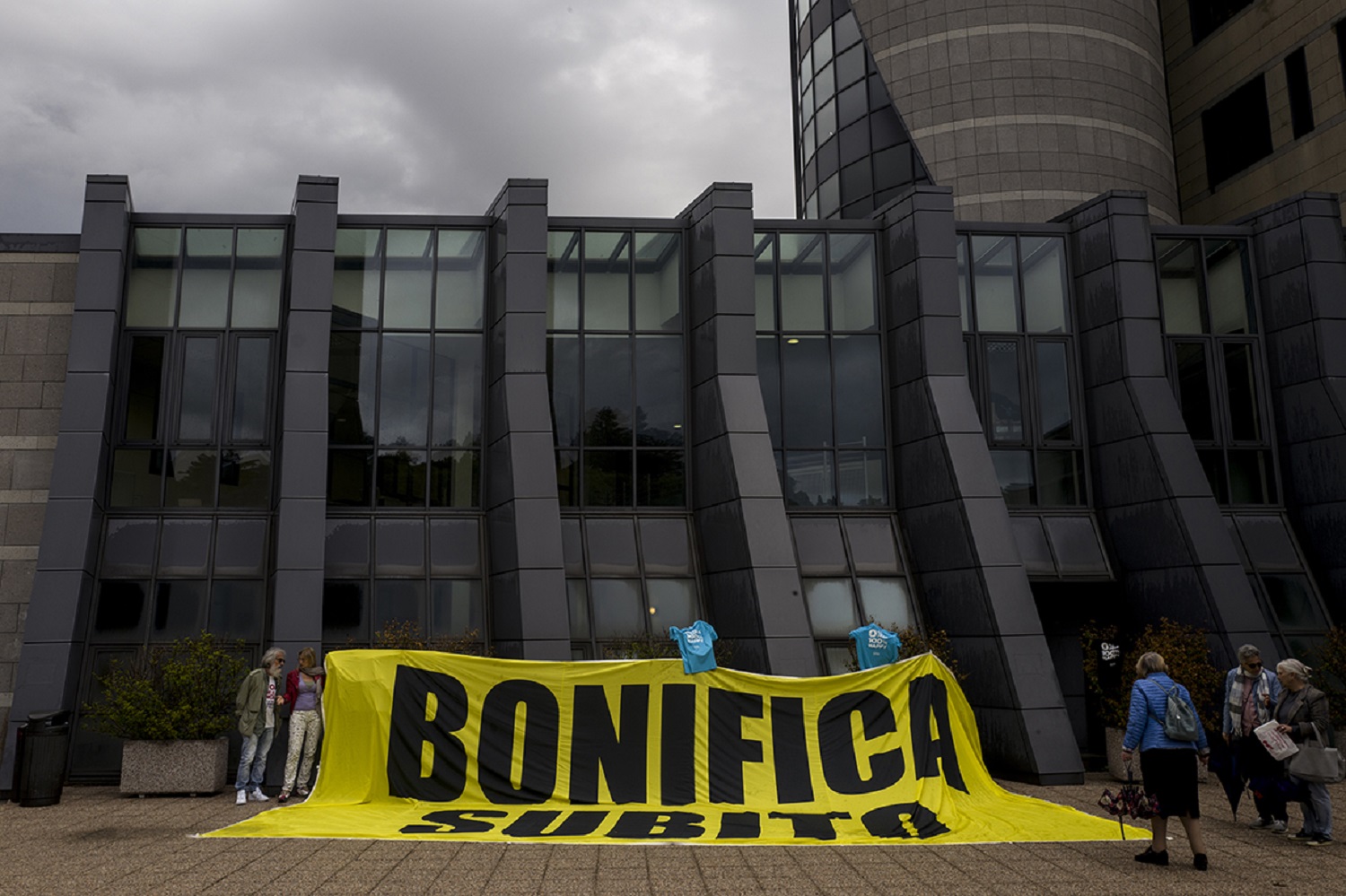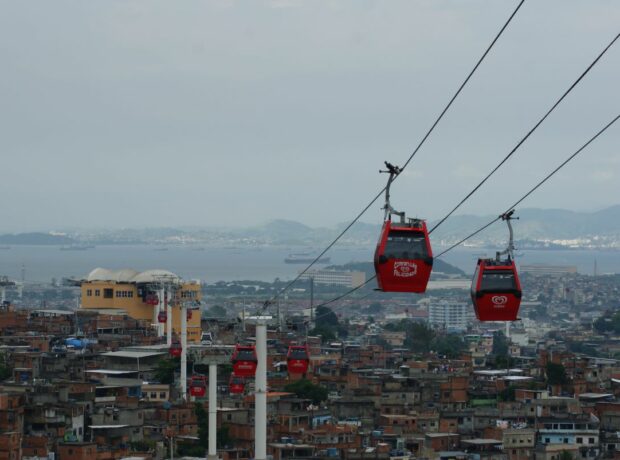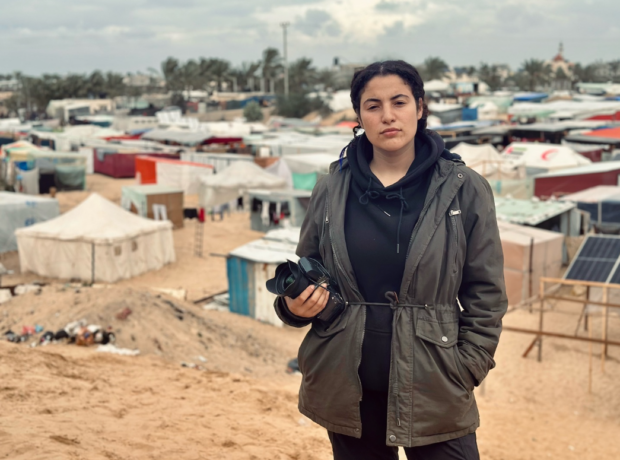In northern Italy a campaign group of mums, Mamme No PFAs, is fighting against the “forever chemicals” that are poisoning their water supply and their children. Beatrice M Spadacini visits Veneto to speak with the Italian mothers who are documenting the devastating health effects of PFAS in an area three times bigger than the US community featured in the film Dark Waters.
On the outskirts of Vicenza, a city in the Veneto region of northern Italy, sits the farm of Elisabetta Donadello. Before having children, she and her husband made a conscious decision to leave Milan and move closer to nature and to Donadello’s family. “We were very intentional about creating a more human-centered lifestyle,” says Donadello, who left a corporate job to become a full-time farmer.
“We gave up secure and well-paying jobs and moved to a rural area. The proximity to the land gives us something truly special.
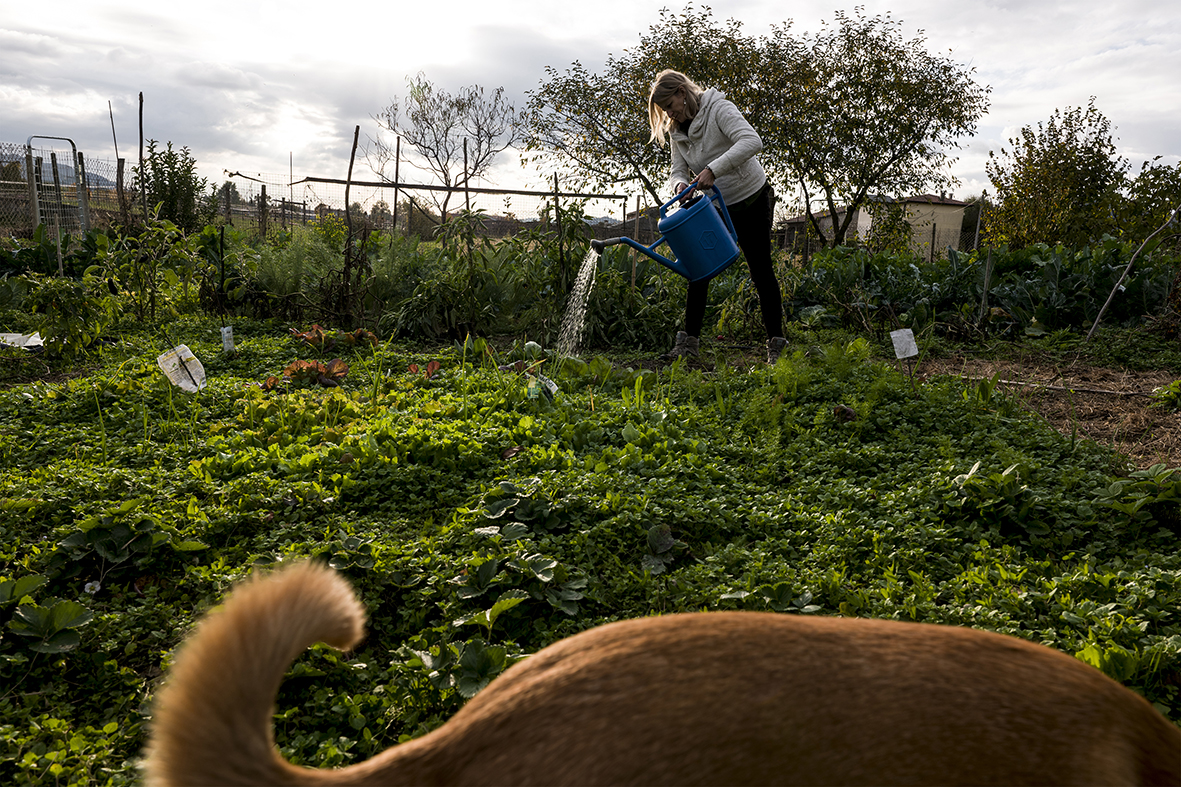
Elisabetta Donadello on her farm.
“Nothing compares to the joy of putting my hands in the land, smelling the raw earth, and eating a raw tomato that I have grown. For our family, this is priceless.”
But if the tomato is grown on contaminated land and irrigated with water containing toxic chemicals, it could be harmful to human health. Donadello did not know that the land her family farm is located on draws water from a compromised aquifer that contains PFAS (per- and polyfluoroalkyl substances). Evidence has shown these substances impact human health.
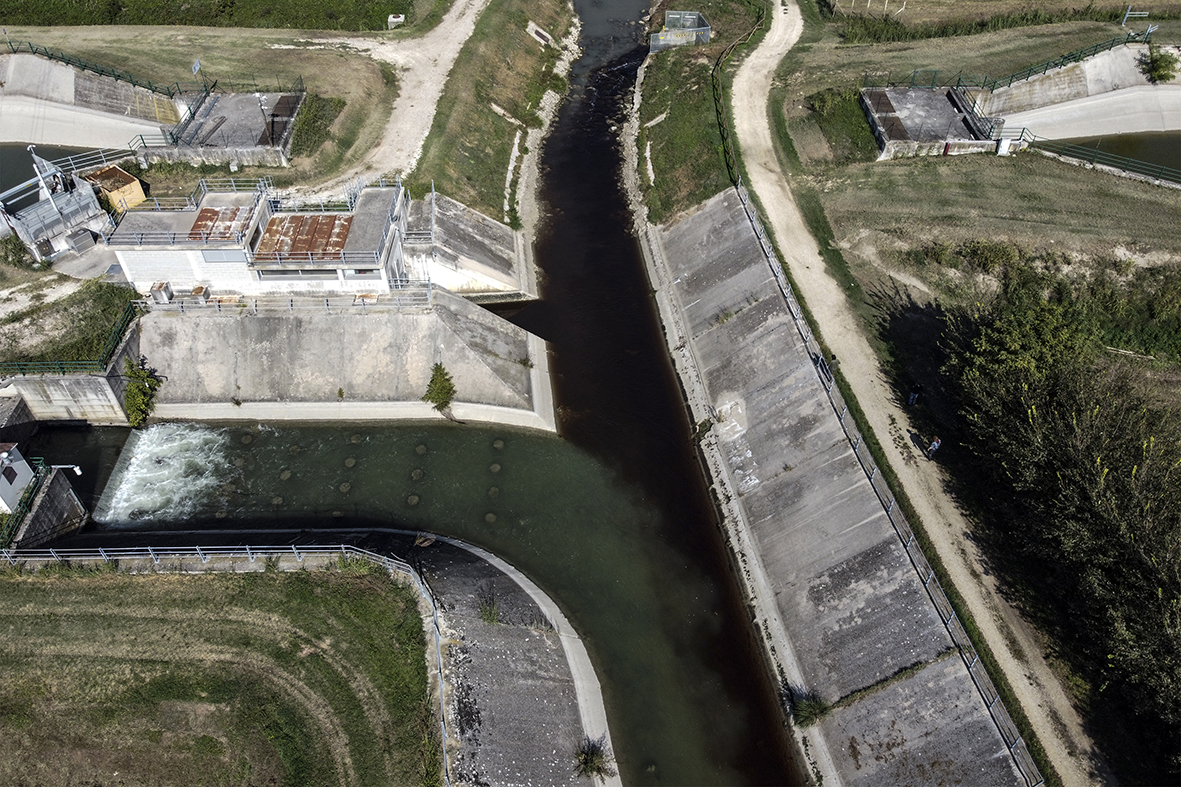
Discharge of the ARICA sewer system, which channels wastewater from five different water purification systems (Trissino, Montecchio Maggiore, Arzignano, Montebello Vicentino and Lonigo) from the Fratta-Gorzone waterway.
The term “forever chemicals” – because they are durable and extremely hard to decompose – is used to describe the PFAS (per- and polyfluoroalkyl substances) family of chemicals, including PFOS (perfluorooctanesulfonic acid) and PFOA (perfluorooctanoic acid). Forever chemicals are used in many products, from non-stick pans to water-resistant clothing, shoes, packaging, cleaning supplies, and even firefighting foam. They have been linked for over a decade to cancer, infertility, decreased immunity, high cholesterol, kidney disease, and many other serious health problems.
A group of 30 international experts from 11 countries convened by the International Agency for Research on Cancer (IARC) in November 2023, concluded that PFOA is carcinogenic to humans and that PFOS is possibly carcinogenic to humans. A summary of the final evaluations was published on November 30 online in The Lancet Oncology.
New study shows PFAS forever chemicals can be absorbed by crops
The possibility that crops grown organically, but irrigated with contaminated water, could also retain these substances is a new finding from a study conducted on a portion of Donadello’s farm by Professor Giancarlo Renell and Associate Professor Antonio Masi from the University of Padova.
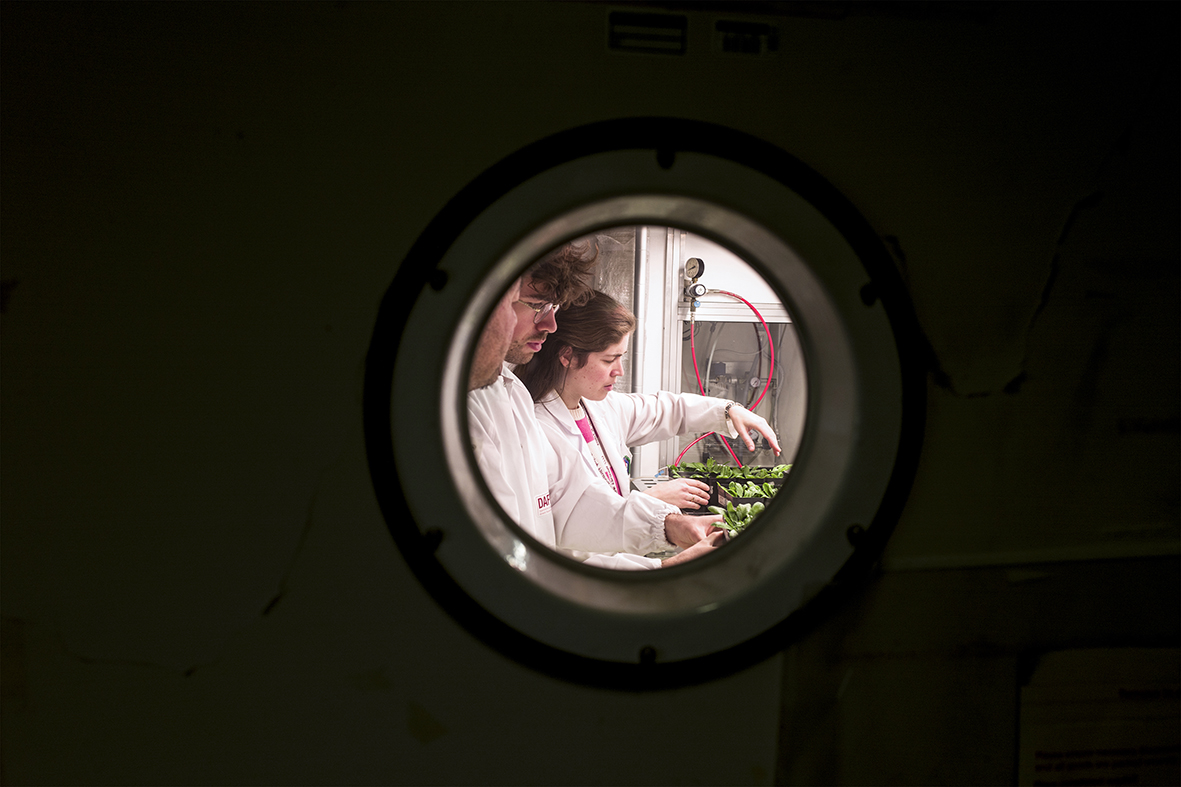
Antonio Masi, Associate Professor at the University of Padova, and his students study the effect of PFAS molecules on plants and soil.
“Our data shows that if there is one molecule of PFAS in a litre of water, then the leaves contain 25 times more chemicals, while the fruits—in this case the tomatoes—contain between 40 and 80 times more,” says Masi.
This is a scary prospect for anyone living off the land or selling their produce in local markets. It may also explain why authorities have been reluctant to admit the extent of the damage.
Donadello first heard of PFAS in 2015 when she had already moved back to her family’s farm and had her first child.
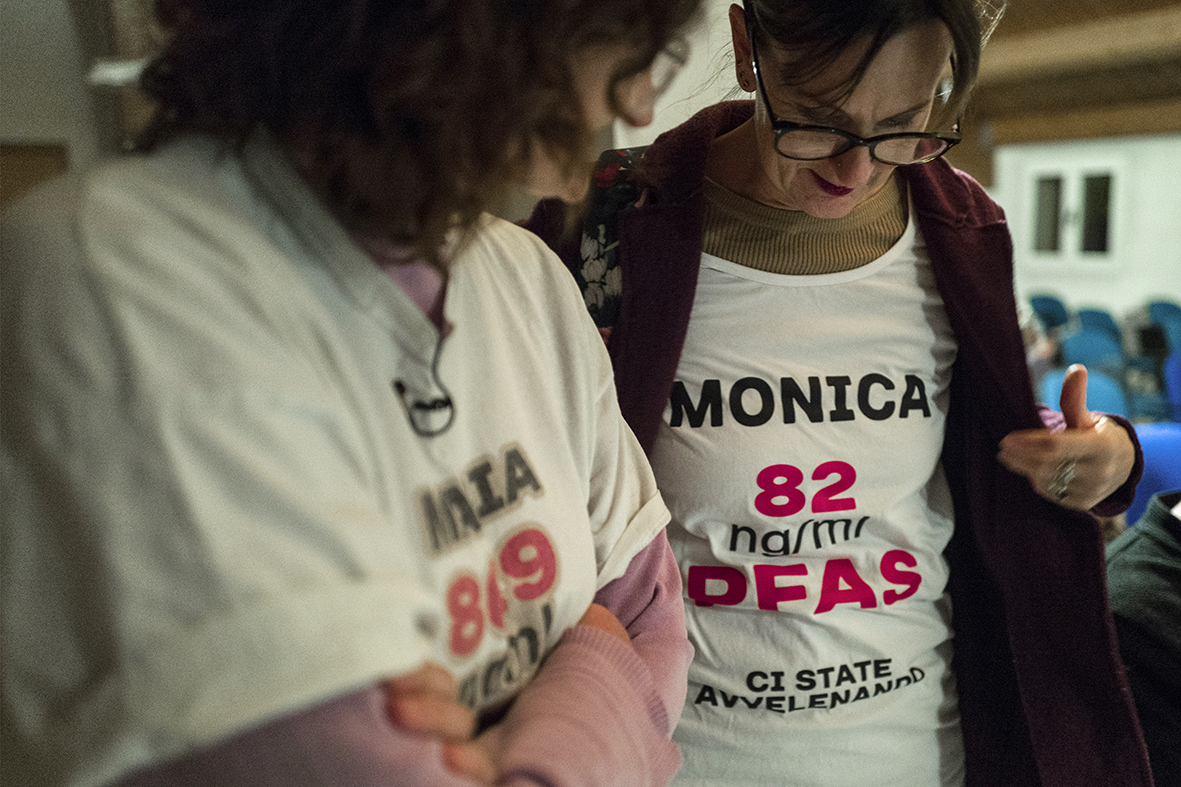
Monica Lea Paparella of Mamme No PFAS shows the T-shirt she wears during protests. The number corresponds to the mg of PFAS in her blood.
“It took me while to understand the dangers these chemicals pose to human health,” she says.
Read more: Mexico: Maya beekeepers declare an environmental emergency after finding scores of dead bees
Donadello is now a member of the Mamme No PFAS (Mothers Against PFAS) movement, a grassroots initiative of mothers living in the area that draws water from the contaminated aquifer, which serves about 300,000 people living between the cities of Vicenza and Verona.
Donadello’s farm is located approximately 30 miles from a site where Miteni SpA, a PFAS-producing company owned by Mitsubishi and Eni operated for decades, until it filed for bankruptcy in 2018. Fifteen top managers are now under investigation for illegally dumping toxic chemicals in the Agno River and surrounding water system.
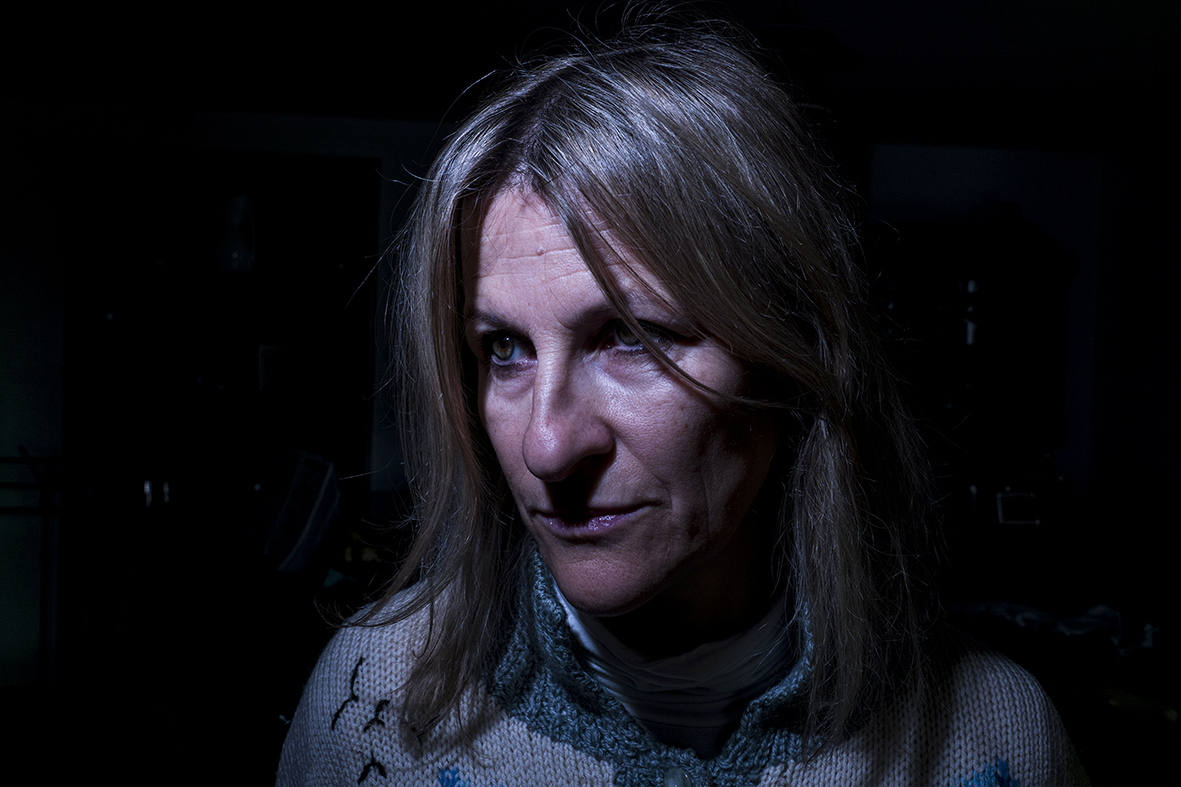
Elisabetta Donadello, a member of Mamme No PFAS.
The new findings from the University of Padova study provides yet more proof of how pervasive these chemicals are – and it is significant because it was conducted in a realistic setting instead of a lab or a hydroponic farm.
“The results demonstrate an accumulation of PFAS in the leaves and fruit of the plant, and the potential risk this poses to locally grown produce,” says Masi, adding that this finding is relevant for other contaminated agricultural areas around the world.
PFAS travel far and wide, but not everyone is treated equally
Technically speaking, Donadello’s farm is in the “orange zone,” the second most at-risk area for PFAS contamination in the Veneto region, according to the official classification by local health authorities. Residents in the “red zone” can have their water and blood tested for PFAS levels as part of a monitoring campaign launched by the region in 2017. But once people know the PFAS levels in their blood, there is not much the region can do apart from putting carbon filters in the water system.
Read more: “It dried up before our eyes”: How the loss of Jordan’s marshes has fractured communities
Donadello pleaded for years with local authorities to test PFAS contamination in her underground water, but because she lives in the designated “orange zone,” she had no right to it. Her children were also not eligible to get their blood tested, despite living only a few miles aways from the high-risk area.
“We kept asking regional authorities to screen the blood of our children, but they always told us no,” says Donadello. “I got my breakthrough in 2022, when a German TV crew came to do a story on PFAS contamination in Veneto.” By agreeing to be in the documentary, Donadello and her family got tested. It transpired that both of her children have high PFAS concentrations in their blood.
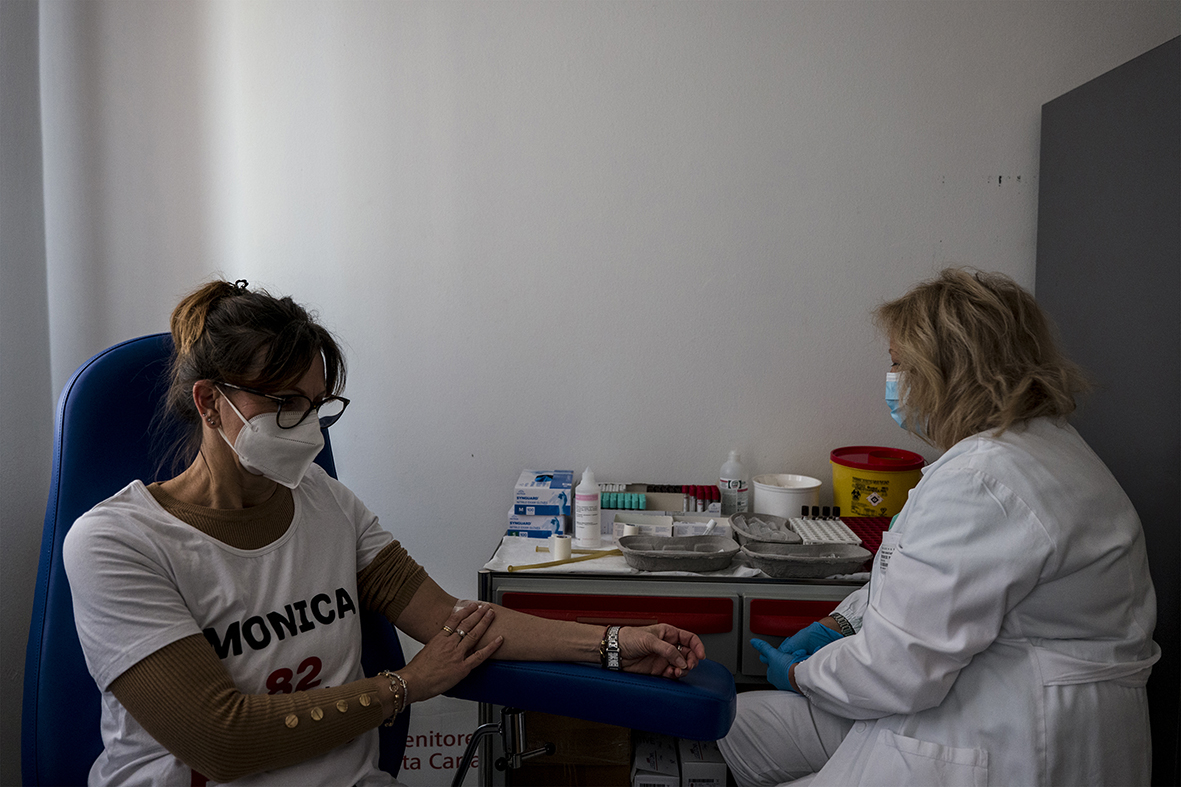
Monica undergoes blood tests to monitor the presence of PFAS forever chemicals in the blood.
By that point, Donadello and her husband had already decided to err on the side of caution and only water their farm with rainwater instead of water drawn from the well. “The authorities never said anything about the produce grown using that same water,” says Donadello, as this could be an economic tragedy. “But, since we eat what we grow, we did not want to risk it.”
A huge environmental disaster
Many people learned about the dangers of drinking water contaminated with PFAS forever chemicals through the 2019 film Dark Waters. The film, starring Mark Ruffalo and Anne Hathaway, is based on the true story of corporate defense lawyer Robert Bilott who takes on chemical giant DuPont in Parkersburg, West Virginia for illegally disposing PFAS waste in a landfill.
In 2017, Bilott won a $671 million settlement against DuPont through a class-action lawsuit a behalf of more than 3,500 plaintiffs. His fight paved the way for multiple settlements worth billions of dollars reached in 2023 against chemical giant 3M and PFAS manufacturers DuPont, Chemours and Cortev. Bilott has testified on behalf of the Italian moms, Mamme No PFAS, twice since the trial against Miteni SpA began in 2020.
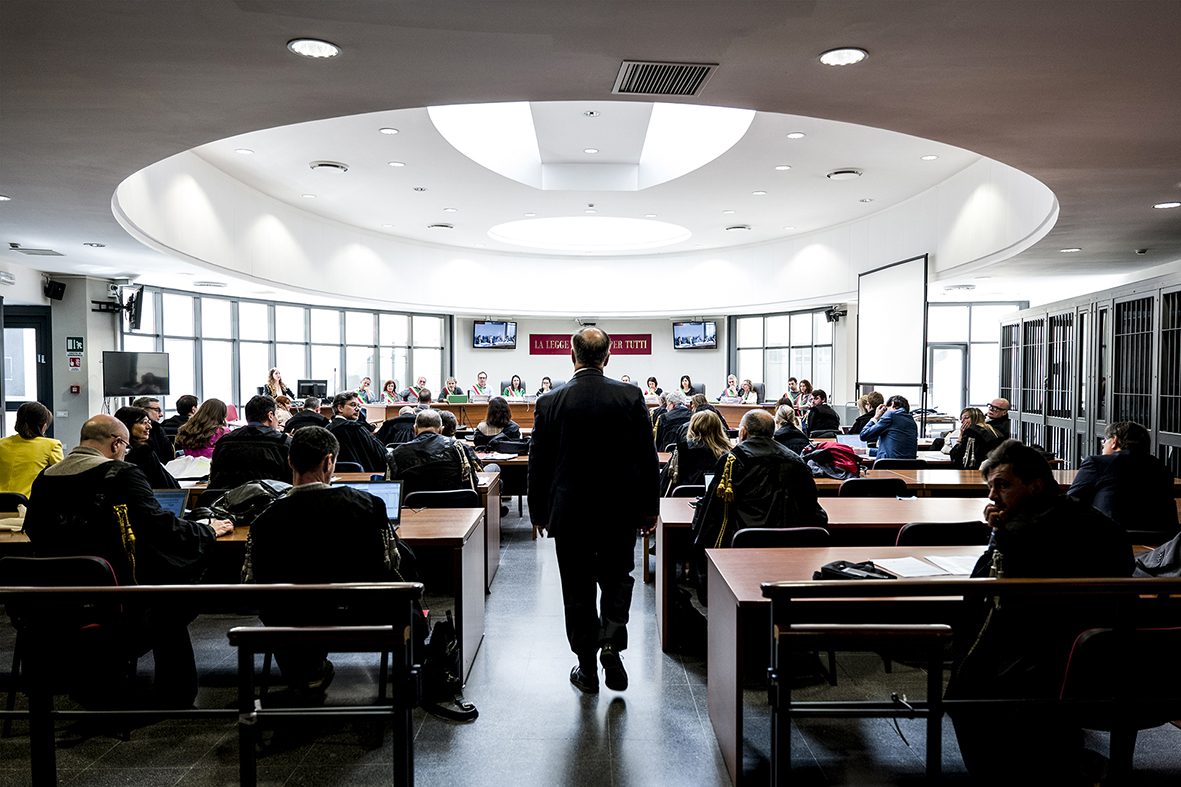
American lawyer Robert Bilott enters the courtroom for the Miteni SpA trial.
The contaminated area in the Veneto region is three times the size of the Dark Waters affected area in Parkersburg, West Virginia, and it is impacting three times as many people. The contaminated aquifer in Veneto is the largest in Italy and the second largest in Europe.
Forging long-lasting friendships while fighting for justice
Italian moms across Veneto have been instrumental in documenting the devastating health effects of these chemicals on the lives of thousands of children and putting pressure on local authorities to hold Miteni SpA executives accountable. For six years, they have been on the frontlines of a herculean fight for health justice, demanding that regional public health authorities clean up their water system.
Michela Piccoli, a nurse from Lonigo and one of the co-founders of the Mamme No PFAS movement, lives in the “red zone” area. In February 2017, she agreed to have her then 15-year-old daughter Maria tested for PFAS in the blood.
“Imagine how I felt when I received a letter in the mailbox with the results of my daughter’s blood tests. The level of PFAS in her blood was 11 times higher than the range considered normal. I was stunned and confused.
“The letter said not to worry, but I contacted other mom friends in the area, who had received equally alarming results, and we began to do our own research.”
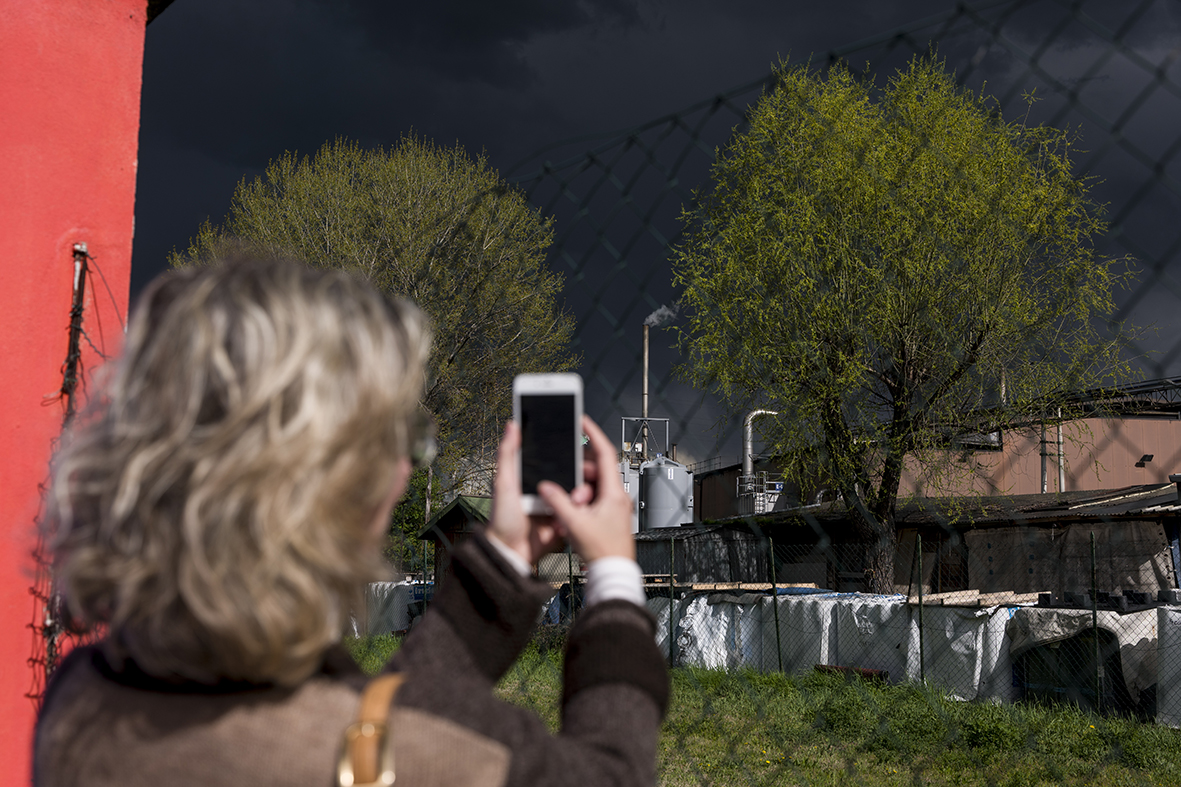
Michela Zamboni, a Mamme No PFAS activist, takes photographs
The Mamme No PFAS activists organize themselves via WhatsApp and Telegram. They contribute their time and resources through dedicated working groups and come from all walks of life. Interestingly, they have never formalized their movement by creating an association. It has grown organically and by word of mouth. Over the years they have realized that not having a single leader is one of their strengths.
Lives turned upside down. Zero tolerance for PFAS is the end goal
Cristina Guasti is one of three lawyers who represents the mothers in the civil case. She says the civil lawsuit seeks compensation for the lifestyle changes of the families impacted by PFAS forever chemicals contamination in the underground water system and for the psychological and emotional damages that the mothers have been subjected to over the years.
“When they found out that their children had PFAS circulating in the blood, everything changed. Their lives were turned upside down.”

Veneto residents demand remediation of the former Miteni factory in Vicenza, blamed for the pollution of the aquifer.
They have spent small fortunes buying bottled water for drinking, cooking and bathing, stopped irrigating their crops and hoped their children would follow their instruction to drink only bottled water when outside their homes.
“These moms bear the burden of knowing they passed this poison on to their children through pregnancy and continue to spend a huge amount of their personal time advocating for justice.”
Guasti hopes that the civil case will be finalized by the end of this year (2024), but the Italian justice system is notoriously slow.
Meanwhile, regional authorities have yet to clean up the site where the Miteni SpA plant stands abandoned, leaking PFAS into the ground. This is the mothers’ main ask, followed by the enforcement of responsible waste disposal by industry, independent research on newer PFAS substances, and an epidemiological study in Veneto on the effects of PFAS contamination on humans.
The University of Padova study also holds some promise because it shows that adding a charcoal-like substance known as Biochar on top of the soil can reduce the amount of chemicals that seep into crops. But, at the end of the day, what the mothers want is zero tolerance for PFAS in the environment, which is a demand echoed by other global activists.
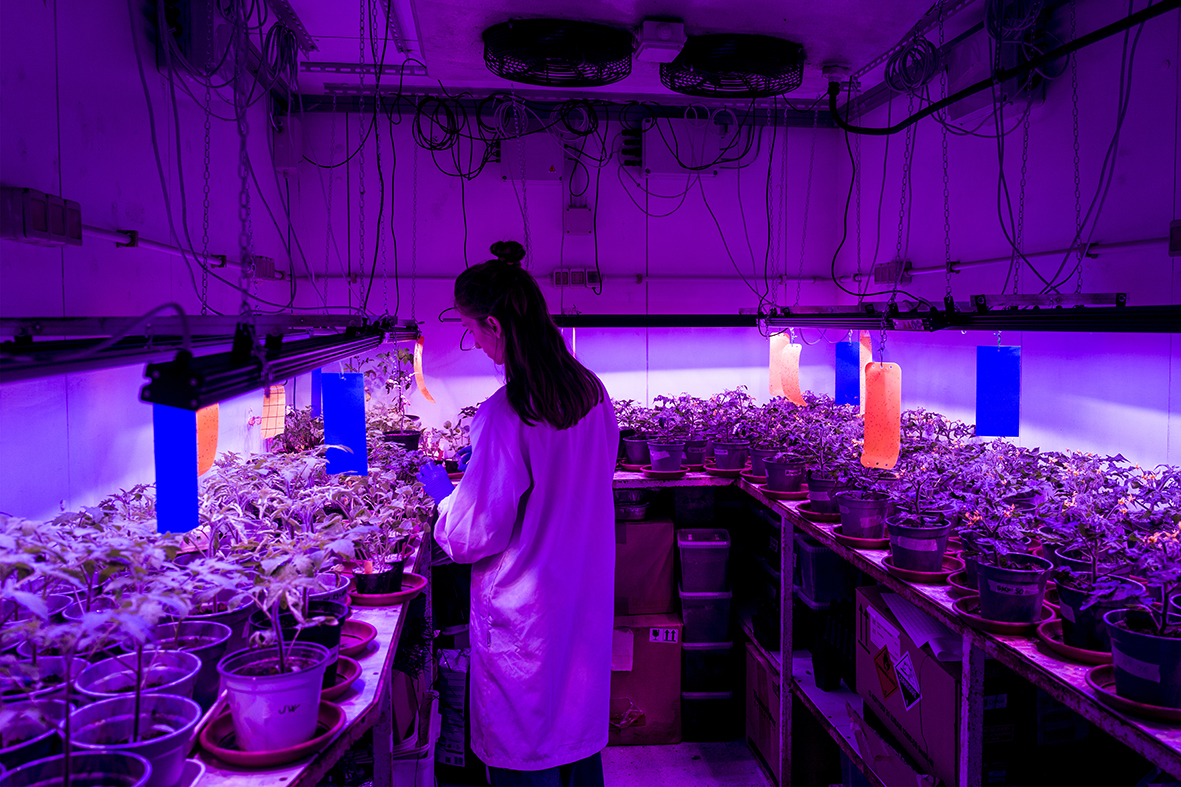
A student studies the effect of forever chemicals PFAS molecules on plants and soil at the University of Padova.
Afterall, “water is at the core of everything,” says Piccoli. “If you don’t go to the root of the problem, eventually you will pay for it, and with a high interest rate.”
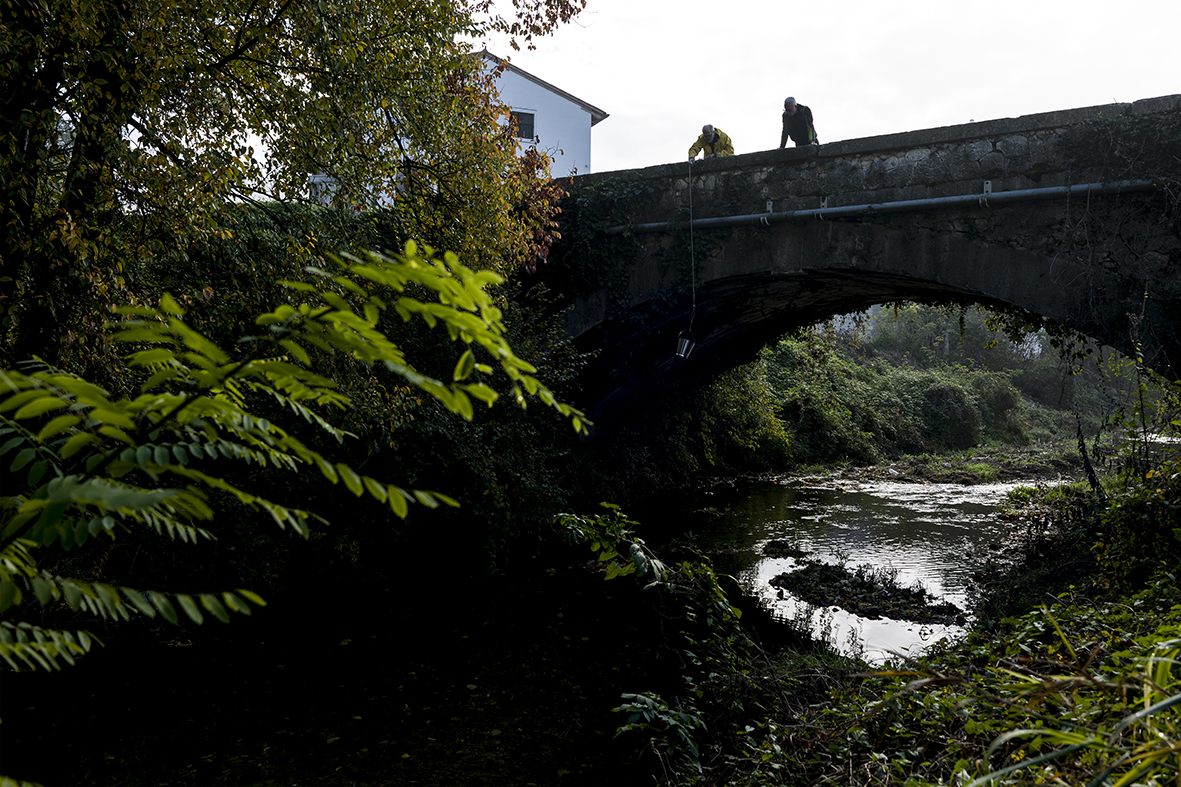
Stefano Polesello and Alberto Peruffo analyse the water of the Poscola stream.
All pictures by Stefano Schirato
Read more:
